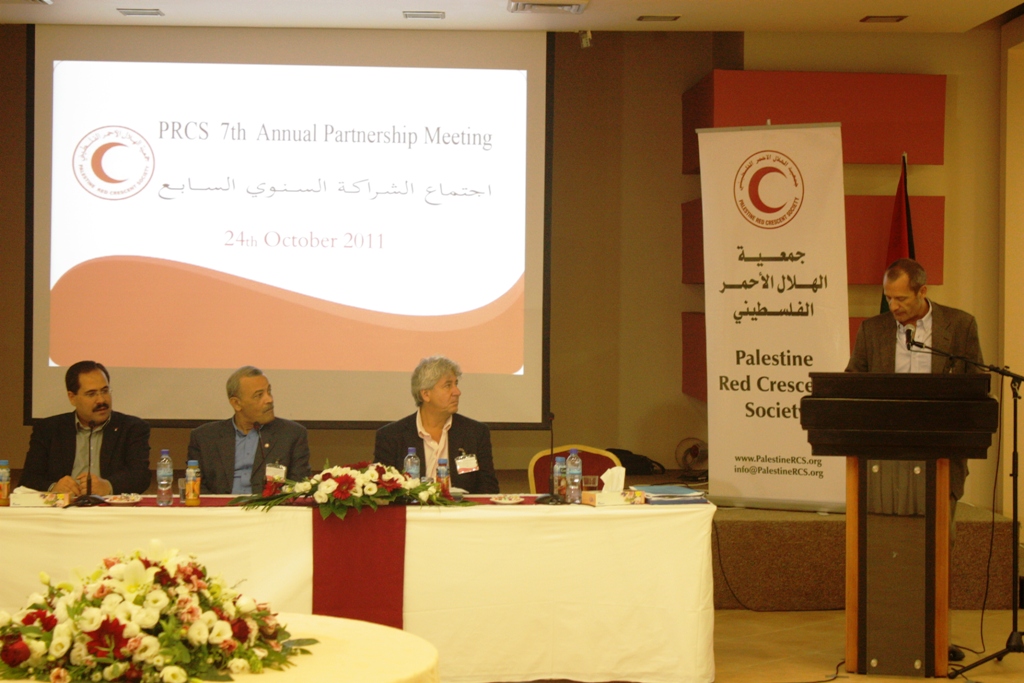
(Al Bireh-24/10/2011): The Palestine Red Crescent Society (PRCS) held its seventh annual Partnership Meeting at its headquarters in Al Bireh in the West Bank. The meeting was attended by representatives from Red Cross and Red Crescent Societies, IFRC, ICRC as well as PRCS/Lebanon which took part in the meeting via video conference.
A minute of silence was observed in memory of earthquake victims in Turkey and of all who fell in the line of humanitarian duty. PRCS President Dr. Younis Al Khatib then took the floor to underline the importance of this annual meeting which constitutes the cornerstone for all future planning efforts with PRCS partners. “This meeting reflects the commitment of National Societies to help Palestinians. You are meeting here today at the end of 2011 to get better acquainted with our plans for next year, with a view to guaranteeing support to the Palestinian people”, he said, adding that “many PRCS programs are either community-based or focus on raising community awareness and are currently implemented in all our branches, including in Lebanon”.
Juan Pedro Schaerer, Head of Delegation of the International Committee of the Red Cross for the Palestinian Territory (ICRC), lauded efforts made by PRCS. “Today we meet in the framework of a partnership which means a lot for us as members of the International Movement of Red Cross/Crescent. Our partnership is built upon common goals and principles. It reflects our common action to make the greatest achievements when it comes to alleviating human suffering. It is this genuine partnership that shapes our joint action. The ICRC shall seize every opportunity to build such partnerships that benefit Palestinians. It shall also fulfill its long standing pledge to support Palestinians by working with various groups within the International Movement”, he said.
Giorgio Ferrero, Representative of the International Federation of Red CrossRed Crescent Societies (IFRC) in the Palestinian Territory, spoke about the new realities in the region in the aftermath of the Arab Spring as well as about local developments in Palestine and the dire humanitarian situation prevailing there due to the occupation, checkpoints, settlements, lack of freedom of movement in the Gaza Strip and the tunnel-based economy there as well as unemployment, collective punishment, conditions in refugee camps in the Diaspora and the dwindling hope of ever returning to Palestine. “Despite all these obstacles, PRCS continues to work with its thousands of staff and volunteers to promote community-based action and provide services to Palestinians in the West Bank, Jerusalem, the Gaza Strip as well as to Palestinian in Egypt, Syria and Lebanon”, he added.
In his analysis of the current political situation in the region, Dr. Sabri Saydam, Advisor to President Abbas, spoke about the ramifications of the Arab Spring in Palestine. He also touched upon the democratic elections in Tunisia and the Palestinian request to join the UN, underlining the need to pay attention to Palestinian expectations. “Attention must be paid to the Palestinian cause which Palestinians have chosen to present in the most noble of manners, i.e. through requesting full membership of the UN. We want a Palestinian State and seek cooperation to this end from all our friends and the international community”, he said.
Speaking via videoconference, Dr. Mohamad Othman, Secretary General of PRCS/Lebanon, welcomed participants and hoped to be able to attend the next partnership meeting in Ramallah in person. Mr. Samer Shihada, from PRCS/Lebanon, presented the branch’s report. Dr. Khalil abou Al Foul, Head of the Disaster Management Department spoke about Health Care under occupation, while Mr. Michel Marcus and Mr. Mike Myers from ICRC spoke about health care in times of armed conflicts. A thorough discussion of these issues took place with participants.
Bashar Mourad, Head of EMS at PRCS/Gaza, touched on the humanitarian situation in the Gaza Strip given the current blockade and Israel’s attack in 2008, while Fatima Skeik from the Primary Health Care Department gave examples of community based action and Obaidah Abou Asab spoke about internal oversight. Tania Abou Ghosh, Head of international cooperation, presented future orientations and fund-raising efforts for next year.